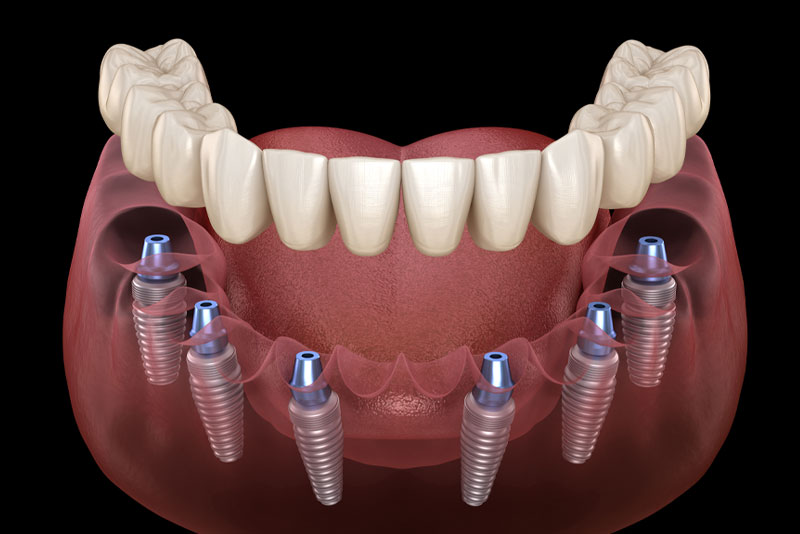Introduction
Dental implants have become a popular solution for individuals who have lost one or more teeth. They offer a permanent and natural-looking replacement that can restore both the appearance and functionality of your smile. However, navigating the world of dental implants can be overwhelming, especially if you are unfamiliar with the process. In this blog post, we will provide you with the essential information you need to know about dental implants, from understanding the procedure to determining if you are a suitable candidate.
Understanding Dental Implants
Dental implants are a popular and effective solution for replacing missing teeth. They are artificial tooth roots made of titanium that are surgically placed into the jawbone. These implants provide a strong foundation for fixed or removable replacement teeth, allowing individuals to regain their smile and confidence.
Benefits of Dental Implants
Dental implants offer numerous benefits compared to other tooth replacement options:
- Natural appearance: Dental implants look and feel like real teeth, enhancing your smile and facial aesthetics.
- Improved speech: Unlike dentures, which can slip and cause slurred speech, dental implants allow you to speak naturally without any concerns.
- Enhanced comfort: Implants become a part of your jawbone, eliminating the discomfort associated with removable dentures.
- Better oral health: Dental implants do not require altering adjacent teeth, preserving your natural teeth and promoting long-term oral health.
- Durability: With proper care, dental implants can last a lifetime, making them a cost-effective solution in the long run.
The Dental Implant Process
The dental implant process typically involves several stages:
Initial Consultation

During the initial consultation, your dentist will evaluate your oral health, discuss your goals, and determine if you are a suitable candidate for dental implants. This may involve X-rays and impressions of your teeth and jaw.
Implant Placement
In the next stage, the dental implant is surgically placed into the jawbone. This procedure is usually performed under local anesthesia to ensure your comfort. The implant is then left to integrate with the bone, a process known as osseointegration, which can take a few months.
Abutment Placement
Once the implant has fused with the jawbone, an abutment is attached to the implant. The abutment serves as a connector between the implant and the replacement tooth or crown.
Summary
Dental implants are a revolutionary solution for tooth loss, providing a long-lasting and aesthetically pleasing alternative to dentures or bridges. This blog post aims to guide you through the world of dental implants, offering valuable insights into the procedure, benefits, and considerations. Whether you are missing a single tooth or multiple teeth, understanding the implant process, including the initial consultation, implant placement, and final restoration, is crucial. Additionally, we will discuss the factors that determine your candidacy for dental implants, such as overall oral health, bone density, and gum condition. By the end of this post, you w linked here ill have a comprehensive understanding of dental implants, empowering you to make informed decisions about your oral health and smile restoration.
- Q: What are dental implants?
- A: Dental implants are artificial tooth roots that are placed into the jawbone to support a replacement tooth or bridge.
- Q: How long do dental implants last?
- A: With proper care and maintenance, dental implants can last a lifetime.
- Q: Are dental implants painful?
- A: The procedure is usually performed under local anesthesia, so you won’t feel any pain during the surgery. Some discomfort and swelling may occur after the surgery, but it can be managed with pain medications.
- Q: How long does the dental implant procedure take?
- A: The duration of the dental implant procedure depends on various factors, such as the number of implants and the patient’s oral health. On average, it can take anywhere from a few months to a year to complete the entire process.
- Q: Can anyone get dental implants?
- A: Not everyone is a suitable candidate for dental implants. A thorough evaluation of your oral health and bone density is necessary to determine if you are eligible for the procedure.
- Q: What are the benefits of dental implants?
- A: Dental implants offer several benefits, including improved appearance, enhanced speech, increased comfort, better oral health, and improved self-confidence.
- Q: How do I take care of dental implants?
- A: Taking care of dental implants is similar to taking care of natural teeth. Regular brushing, flossing, and dental check-ups are essential to maintain the health and longevity of your implants.
- Q: Are dental implants covered by insurance?
- A: Dental implant coverage varies depending on your insurance plan. It’s best to check with your insurance provider to understand the extent of coverage for dental implants.

Welcome to my website! My name is Ben Stout, and I am a dedicated and passionate Dental Hygienist with years of experience in the field. I am thrilled to share my knowledge and expertise with you through this platform.
As a Dental Hygienist, my primary goal is to ensure optimal oral health for my patients. I firmly believe that a healthy smile is not only aesthetically pleasing but also crucial for overall well-being.



